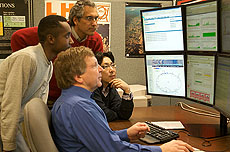Tier-3 computing centers expand options for physicists

Professors Nural Akchurin, Sung-Won Lee, Alan Sill and graduate student Vanalet Rusuriye examine data transfer and local cluster performance for the Tier-3 center at Texas Tech University while remotely monitoring parameters of the LHC accelerator and CMS experiment. Image courtesy of Alan Sill, TTU.
Researchers at Texas Tech University work more than 5,000 miles from CERN, but they will have just as much chance of making new physics discoveries using the data collected at the Large Hadron Collider as scientists in Switzerland.
Texas Tech runs a Tier-3 computing center that is part of the CMS collaboration, allowing physicists there to host and analyze data from the experiment locally. Tier-3 centers make up one of four tiers in the LHC Computing Grid.
"Tier-3 sounds like the bottom of the chain," said Alan Sill, a senior scientist who runs the center, "but in a way it's the top of the chain. It's the first level at which physicists have access to data under their own control."
A single Tier-0 site, at CERN, processes raw information and sends it around the world to Tier-1 centers. CMS's seven Tier-1 centers reprocess the data and break it into subsamples to send to about 35 CMS Tier-2 centers. Tier-2 centers host data for the experiment and devote much of their time to running centralized simulations, but also provide resources for individual physicists' analysis jobs.
-- Kathryn Grim
Read more
|